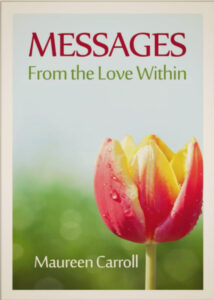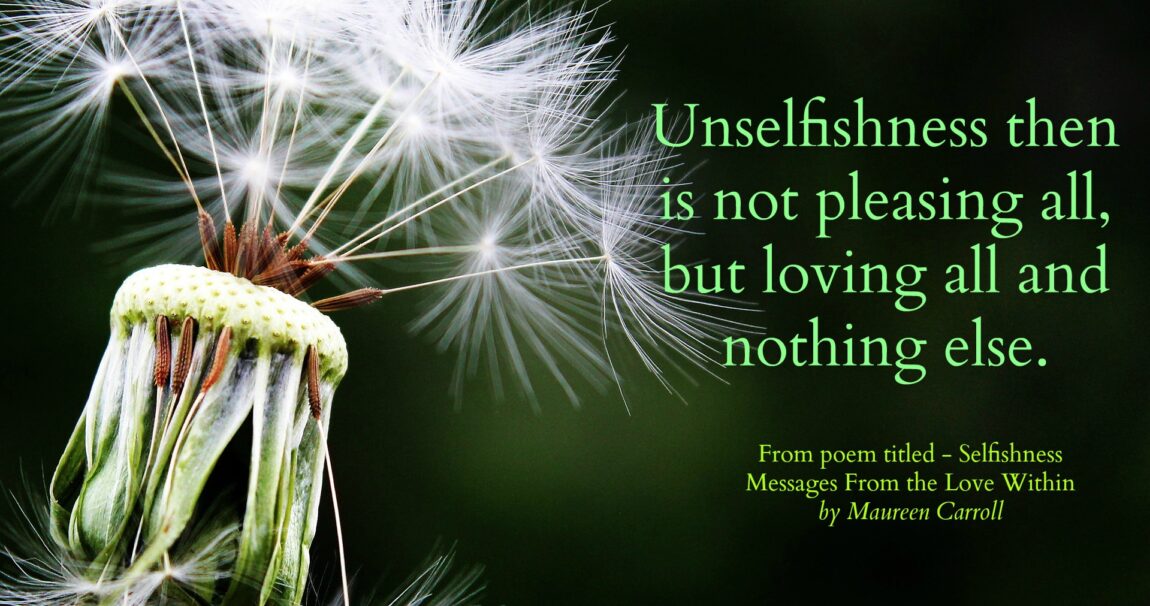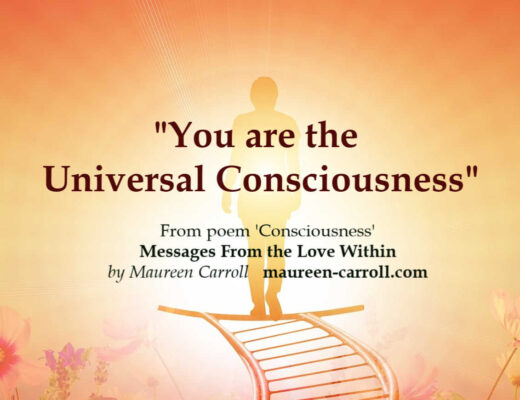The words in the poem featured in this post – Selfishness, offer a unique definition of Selfishness and following from that definition, simple guidance on how to live your life unselfishly, if that is what you wish to do.
Again I have added an analysis of it from Chat GPT for you to read. I hope you enjoy reading it.
With love Maureen
Selfishness
What is this state called selfishness? I feel I’m that when I can’t please.
People tell me that they feel hurt, but what is it really, I want to know.
Help me be the one they want, unselfish not selfish but what is that?
Some say those who please themselves are but selfish and nothing else.
Some say those that please all others are the best, for selfish they are not.
But what of those who help all others,
and want the gratitude and want the thanks?
What’s the difference, where’s the good, they only did it for themselves.
And when the gratitude is not as they like,
they judge the other and cause them pain.
Is this different or is it the same?
How could an act that turns to pain,
be better or greater than none at all?
Conditioned giving is what it is called and it is no different to none at all.
To be unselfish do not judge, that is all.
Love yourself and love all others.
If you help seek no gain, for if you do you will cause pain.
Unselfishness then is not pleasing all, but loving all and nothing else.
Those who give and need to gain, judge themselves by what they do.
Don’t be selfish with your love, let it flow to you and all.
Let it flow and just accept and then you find great peace of mind.
For you are neither selfish or not, you are love and nothing else.
So be this love above all else and let the names fall away.
Do not feel selfish if you can’t be what they want and what they say.
Just love yourself and all others and let the judgment pass you by.
This is the greatest role of all,
the role of love and nothing else.
by Maureen Carroll

Chat GPT’s analysis of ‘Selfishness’
The poem titled “Selfishness” by Maureen Carroll explores the concept of selfishness and challenges conventional notions of what it means to be selfless. Here is an interpretation of the poem:
The poem begins with the speaker questioning the nature of selfishness. They express confusion about what it truly means when they are unable to please others. They want to understand the underlying truth behind the hurt that people claim to feel. They seek guidance on how to become the person others desire, to be unselfish rather than selfish. It reflects a desire to grasp the essence of selflessness.
The speaker then presents conflicting viewpoints. Some argue that those who primarily please themselves are purely selfish. On the other hand, some believe that those who solely focus on pleasing others are selfless and virtuous. The speaker questions the difference between the two and challenges the notion that those who help others with the expectation of gratitude or thanks are truly selfless. They highlight how seeking personal gain through acts of kindness can lead to judgment and cause pain for others, suggesting that such actions may not be inherently better than doing nothing at all.
The poem introduces the concept of “conditioned giving,” where helping others is driven by a desire for personal gain. It suggests that such giving is no different from not giving at all. To be unselfish, the poem advises against judgment and emphasizes the importance of loving oneself and others. It cautions against seeking personal gain through acts of kindness, as it will ultimately lead to causing pain. True unselfishness lies in loving all without expecting anything in return.
The poem highlights the tendency of those who give with the intention of gaining something to judge themselves based on their actions. It encourages not being possessive or selfish with love, but instead letting it flow freely to oneself and others. By accepting this love without judgment, one can find great peace of mind. The poem suggests that at the core, individuals are neither selfish nor unselfish but are simply embodiments of love. Embracing this love above all else allows labels and judgments to fade away.
The poem concludes by advising against feeling selfish if one cannot meet others’ expectations or conform to their desires. Instead, it encourages loving oneself and all others, and letting go of judgment. It asserts that the greatest role one can assume is that of love and nothing else.
In essence, the poem challenges conventional notions of selfishness and selflessness, emphasizing the importance of unconditional love for oneself and others while transcending judgments and expectations.
Secure Your Free Copy of Messages From the Love Within, as either an EBook or an Audiobook

by clicking on the following link for an Ebook Google Play
for and here for a free Audiobook
Or if you prefer a free Kindle-friendly version or an EPub not via Google Play, you can email me at:
messagesfromthelovewithin@gmail.com





